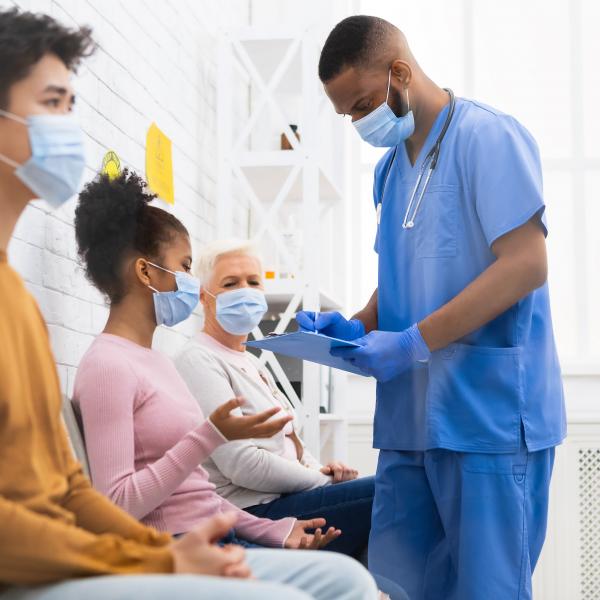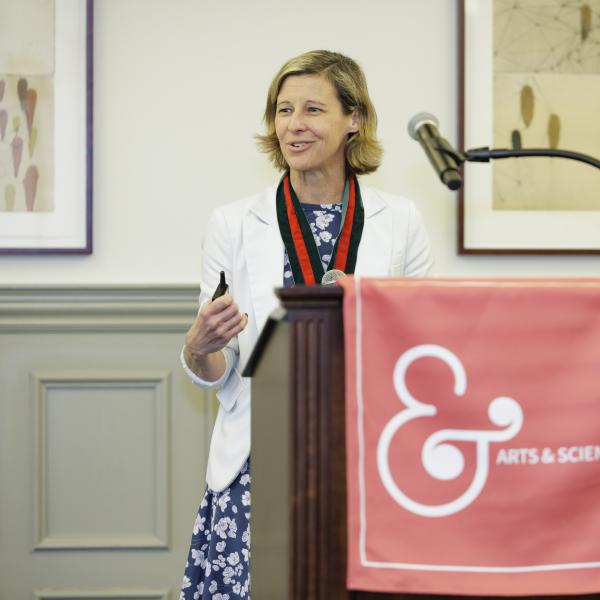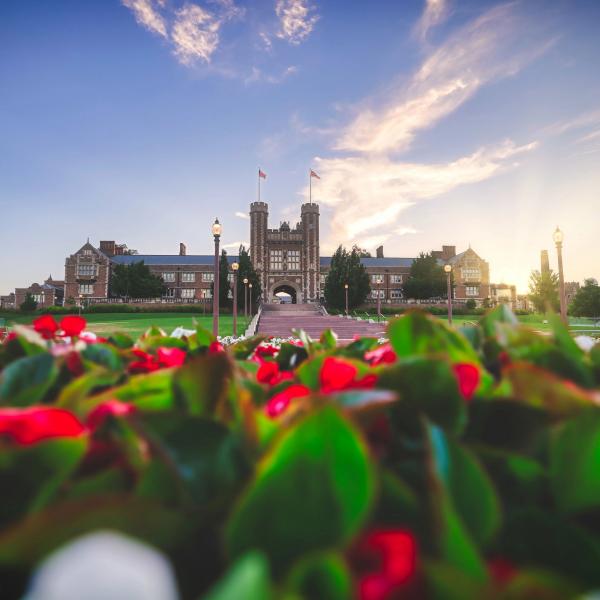Shahla Farzan, a reporter for St. Louis Public Radio with a focus on science, visited the biology department Oct. 25 to discuss science communication. We sat down with her to talk more about her background, inspiration, and process.

What inspired you to get into science communication?
So, my path into this has been very roundabout. I started out editing my high school newspaper and working part time for my local newspaper in the northwest corner of Connecticut. Then I got to college, started exploring different opportunities, and I took a science class taught by this really kooky scientist. He was an amazing scholar that got me really excited about science in a way that I hadn’t been before. Before long I had a major in biology and ended up graduating really interested in research. After a year as a research assistant in Guam I went to UC Davis to pursue a PhD in ecology.
It seems to me that a lot of science writers get into their field in a kind of roundabout way. At least from what I’ve seen, most always have interesting life paths until one day they find themselves writing for a living.
Yeah, so that’s kind of how it happened for me. For me, I realized part way through grad school that I wasn’t that passionate about the research that I was doing. I liked talking about science more than I liked doing it, so I started exploring science communication opportunities, did a handful of internships, fellowships, and realized I really loved it. It got me excited in a way that research didn’t. I had a very understanding mentor in grad school that let me do internships even when they took me away from the lab a few days a week.
I worked at Capital Public Radio in Sacramento where I did the stories beat reporters didn’t want to do. I was probably like one of those go-getter interns that everyone could count on for a story. So after a couple of these internships I did kind of a crazy thing when I was finishing up my PhD, which is that I decided to take a job at an NPR affiliate in Alaska. I was really desperate to be done with my degree and I saw this job in Homer, Alaska. It was a full time reporting gig where you also hosted Morning Edition since it was understaffed compared to bigger city stations. The great thing about working there is that there aren’t many reporters itching to get up there, so it’s a good place for young reporters to cut their teeth.
What is it about this job that ended up taking up more of your time than you expected? Especially as a newer reporter here, I’m sure you’ve encountered a few of these things recently.
I spend quite a bit of my time doing background research for these stories, partly because they’re often very complicated research stories. So, when I have time I like to read the full research study because there are a lot of really interesting details that don’t make it into the press releases. I ask myself, what do I think the story is here? What are the important details? I think what I see as a scientist might not be what a media relations person sees as the important details, and they’re often the ones who are writing the press releases.
"What I see as a scientist might not be what a media relations person sees as the important details, and they’re often the ones who are writing the press releases."
Another one is, not surprisingly, that I’ve spent so much time talking to people and over time learned how to be a better interviewer by picking up social cues like when someone is feeling uncomfortable or doesn’t want to answer a question. I’ve learned to just kind of let the interview go where it’s going to go, which is a difficult skill for sure. I think that if you’re just focused on getting what you need, like sound bites for a particular story, you’re going to miss some of those details that are really important, such as another project they are working on. I think that’s one thing I do spend a little more time than I expected – just sort of letting interviews breathe a little when I have the time.
I guess a perk of working in St. Louis local radio is that the majority of stories you’re covering are local and you can go out and meet people, whereas if you were working for a national outlet it would be more difficult to meet people from, say, across the country.
Yeah, working locally really allows you to get to know a place and see how some of the inherent issues evolve and everything else that makes that particular city special and different. That’s why I really recommend that young reporters start out a local outlet because it teaches you some really important interpersonal skills and that every story is important. Even seemingly small stories still have bigger implications. Getting to know how local government functions, like going to city council meetings, can be mind-numbingly boring, but when you pick up on the inner workings of them it can be really, really interesting. That was something I learned in Alaska.
"I really recommend that young reporters start out a local outlet because it teaches you some really important interpersonal skills and that every story is important."
That’s another cool aspect about your job. You’re not holed up writing about ecology all the time, you can branch out into other things as well.
Yeah, I’m a general assignment reporter right now with a special focus on science, but my editor lets me cover all kind of health and environment stories in line with my interests and background. I’m not constrained within any one beat.
How do you stay on top of all the research that comes out? To me, this seems like one of the most difficult parts of the job, especially with the sheer amount of studies that come out every day.
One thing I really like to do is set up a lot of Google Scholar alerts. You can set them up with very specific terms and get emails everyday about new scientific papers. For example, I’ll say I want any research article from Washington University in St. Louis or St. Louis University. Then I sift through and find the research studies. I would say a lot of the stories that I cover are coming from studies that popped out to me from just scrolling through. A big challenge for me is when studies come out that aren’t in my field of expertise, such as medicine. This is where knowing how to read scientific papers is really useful, but it doesn’t mean that I’m any more informed about what I’m covering than any other science reporter.
What unique approaches do you have to convey complex information?
How many hours do you have? There are many different ways of going about this. One of them of course is by very carefully using analogies and metaphors. For example, a WashU researcher I talked to described how tuberculosis affects the immune system as “disarming the burglar alarm on host cells.” It’s not a perfect analogy, but I liked it because it’s a concept that people are going to understand. It gives someone a sense of the chain of events that occurs.
Also, I think it’s important to think about jargon. Some terms mean completely different things to scientists and nonscientists such as “positive correlation.” It’s important to clarify these terms or simplify them.
Often as science communicators we only talk about studies after they’re done. But what I really like to do is talk about science in progress. So I’m often encouraging researchers to get in touch with me and talk about their ongoing research. It’s important to convince them that it’s okay to not know what the conclusions are. I want to bring people out and show the messiness of the process.
"Often as science communicators we only talk about studies after they’re done, but what I really like to do is talk about science in progress."
I have a bit of an unrelated, but still essential, question. What is one habit or routine of your workday that gets and keeps you going?
I would say for me coffee and my standing desk. Sitting down turned me into a little bit of a newsroom troll just hunched over all the time. So it’s nice to be able to stand now. They used to be more expensive a couple of years ago but now I think they’ve come a long way and there’s enough competition in the market to make them in the reach of a radio reporter now.
Also, I like to walk dogs. I volunteer at a tiny, local rescue that takes some of the toughest cases from East St. Louis. A lot of them are in rough shape, but they just want some love.
How do you feel about the future of science communication?
I feel really optimistic about the future of science communication. There are so many different ways to communicate information to people now. It’s not just people picking up a newspaper. There are also podcasts, public radio, blogs, and videos. This is great, but it also makes our job harder because the audience is very dispersed. My main role is making sure that the pipeline of information is open, accessible, and understandable to people. People can take that information and do what they will with it.



